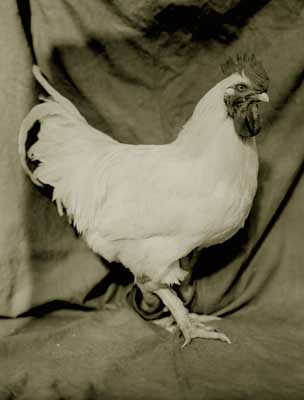

|
Ours is an age of anxiety about the creatures and our relations with them. One of the best accounts I know of this anxiety is Margaret Visser's meditation, in her bestseller Much Depends on Dinner, on the chicken, the bird closest to us, though, as she says, one that has "seldom roused people's affections—they are too scratchy, self-absorbed, un-mammalian, and above all, too edible for that." Visser's chapter on chickens includes information about their uses in classical divination, their relations with the sun-gods of various cultures, fighting cocks and farmyard habits. She has a delightful etymological list: "Gallus is the Roman name for the bird; some have thought that the name refers to France, Gallia, which may have been one early introducer of chickens to the Italian peninsula, Greek Sicily being the other. It is much more likely, however, that gallus comes from the same root as the word "poultry." This root is the Hindu word pil, which becomes pullus and gallus (Latin) pollo (Italian), poulet (French) and pullet (English). Another widely-used stem for words designating chickens is thought also to originate in India: it is kuk, Sanskrit kukata, Latin cucurio, kuku, in many African languages, Kuchlein (German), coq (French) kieken (Dutch) cock and chicken in English." |